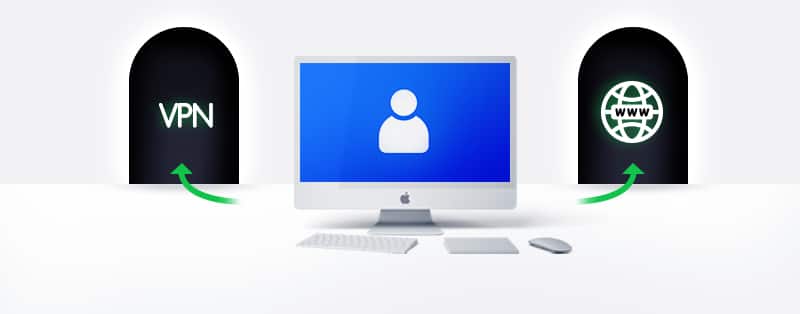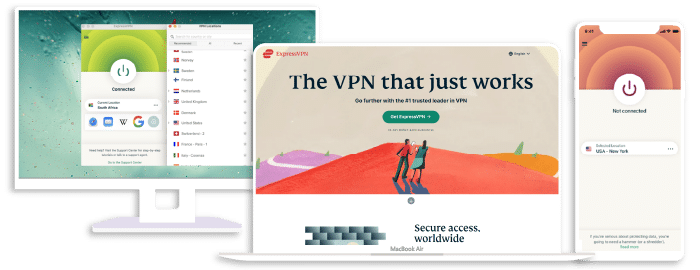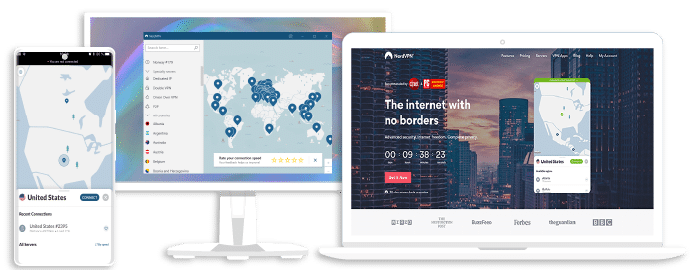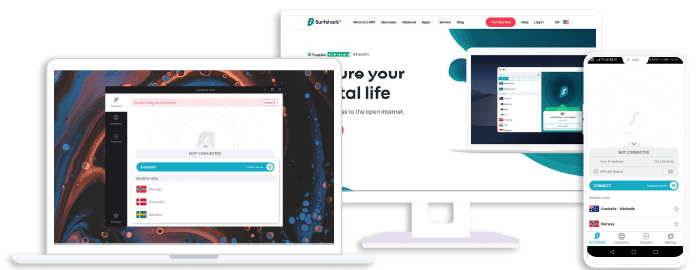What Is VPN Split Tunneling?

A Virtual Private Network (VPN) hides your real IP address and location, and it also offers other security and privacy features. Once you connect to a VPN server, all of your data traffic gets rerouted through a secure tunnel, and other protocols are implemented.
A typical VPN connection routes your entire data traffic through a VPN server, but there are cases where you don’t require a VPN connection. For example, the best way to go with banking websites apps is to use your original IP address and location. You may be wondering if you’ll have to disconnect your VPN every time you want to use such services. What if I told you that you don’t necessarily have to? You can, instead, make use of a VPN feature known as split tunneling.
In this article, you’ll get to understand the concept of split tunneling, how it works, and what VPN providers offer the helpful feature. Let’s get to it!
What Is Split Tunneling?
Split tunneling is a VPN feature that separates your internet traffic. Some of it gets routed through a secure encrypted tunnel, while the rest passes through your Internet Service Provider (ISP) network. Split tunneling lets you decide which apps will be secured by the VPN and which will connect directly to the internet.
This feature comes in handy when you intend to use a VPN only for specific activities, while the rest of your device stays connected to your local network. Basically, it gives you access to two networks at the same time. It also helps you save some bandwidth.
Split tunneling gives you a lot of control over your online privacy and security. Usually, your device establishes a direct connection to the internet for data transmission. However, a VPN creates an encrypted link between you and a VPN server.
The split tunneling feature works by allowing two types of connection: the secure encrypted VPN connection and a direct, unprotected connection to the internet. There are different types of split tunneling that you could get your hands on, and we’ll be talking all about that shortly.
Types of VPN Split Tunneling
There are a couple of ways VPN providers provide VPN split tunneling:
App-Based Split Tunneling
This type of split tunneling works with the apps on your device. It allows you to decide which apps traffic will be routed through a VPN server, leaving the remaining apps to send their traffic through your regular network.
Website-Based Split Tunneling
This is similar to app-based split tunneling, but it works with website URLs instead. It allows you to select the specific URLs you want to encrypt with your VPN. This feature is usually available through a VPN browser extension.
Inverse Split Tunneling
This method works differently from the first two types. With the first two types, all your traffic is routed through your open network unless you select which apps and websites you want to route through your VPN. However, with inverse split tunneling, the entire traffic from your device is routed through VPN servers unless you specify what apps and websites you don’t want to pass through the VPN tunnel.
How To Use VPN Split Tunneling
Split tunneling is simple to set up. Although the settings vary among VPN clients, a general way to enable split tunneling is to navigate the ‘Settings’ or ‘Options’ section of your VPN app and select ‘Split Tunneling.’ Once you do that, you should have the option for the kind of split tunneling you’ll like to use. From there, you can select the apps or websites you want to connect to the VPN and which you want to connect directly to your network.
Pros & Cons of VPN Split Tunneling
There are several benefits and drawbacks to using VPN split tunneling. This doesn’t mean it is not a great feature. Let’s highlight some pros and cons so you can decide if split tunneling is a feature you’d want to use:
Pros
1. Split tunneling allows you to connect to two networks at the same time. So, you can access a VPN network or your work network while you stay connected to your local network without connecting and disconnecting your VPN app.
2. Split tunneling saves you some bandwidth because only some of your internet traffic passes through the VPN server. If your ISP limits your bandwidth, the feature lets you delegate your traffic as you like.
3. VPNs use complex security and privacy protocols that can slow your connection speeds in some cases. However, you can avoid such slow down with split tunneling because you can decide what app or website you don’t want to run through the VPN.
Cons
1. The major disadvantage of VPN split tunneling is that it’s not as secure as using a VPN for all your internet activities because it lets apps and websites bypass your VPN’s security features, leaving an opportunity for hackers to attack you.
2. It can take some time to set up split tunneling the way you want because you’ll have to select which websites or apps you want to connect through your VPN or not.
3. Split tunneling features are not available with all VPN providers, and even if it comes with a VPN, only some operating systems support such features.
4. Split tunneling needs to be set up correctly and securely. If not, third parties could access your information.
Recommended VPN Providers That Support VPN Split Tunneling
Split tunneling is a very helpful feature, but not all VPN providers provide it. Even among VPN providers that offer the feature, you should stick with the best. Here are some recommended VPN providers that provide split tunneling:
ExpressVPN
Overall score: 9.8
- 3,200 servers across 105 countries
- Works with streaming platforms
- AES 256-bit encryption
- Supports private protocol, Lightway
- Money-back guarantee
30-day money-back guarantee
ExpressVPN is the very best VPN provider for split tunneling. Unlike most VPN providers, ExpressVPN implements two methods of split tunneling. It has ‘split-include’ and ‘split exclude’ features that let you route all your traffic through the VPN, route only traffic from select apps, or route all your traffic except that from specific apps.
Furthermore, ExpressVPN provides an app for wifi routers. This app also has its form of split tunneling. You can select which of your devices will send their traffic through the VPN server and which will connect to the open network.
ExpressVPN has more than 3000 servers in 90 countries, and these servers offer unlimited bandwidth. In addition, the servers give you access to restricted content on streaming platforms like Hulu, Netflix, Amazon Prime Video, etc.
This VPN provider uses military-grade encryption, OpenVPN, Lightway, IKEv2, and L2TP/IPSec protocols. Its other features include a kill switch and IPv6 and DNS data leak protection.
ExpressVPN client apps are straightforward to use, and it supports various languages including French, German, Japanese, and others. In addition, the apps are available for Windows, macOS, Android, iOS, and Linux.
You can decide what aspect gets routed through this VPN by subscribing to an available plan. With one account, you can connect 5 of your devices simultaneously. Also, ExpressVPN has a 30-day money-back guarantee on all their packages.
Exclusive offer for Techrobot readers: $2.79/month (Save 79% + 4 Months FREE)
30-day money-back guarantee
NordVPN
Overall score: 9.6
- 8,700+ servers available in 129 countries
- Connect up to 10 devices simultaneously
- Great security features
- Verified no-logs policy
- Unblocks streaming platforms
30-day money-back guarantee
Unlike ExpressVPN, NordVPN offers split tunneling through its browser extensions for Chrome and Firefox. This is website-based split tunneling that lets you choose which website will use the VPN and which will connect to the open network. This isn’t a very flexible option, but it may be perfect for you if you only want to protect your browsing history. Although the split tunneling feature is limited to Windows and Android devices, NordVPN apps are also available for macOS, Linux, and iOS devices.
NordVPN has top-notch security that encrypts your web traffic twice thanks to its Double VPN technology. The VPN uses military-grade AES-bit encryption. It also has a kill switch and DNS leak protection.
NordVPN has over 5400 VPN servers in 59 countries. With the NordLynx protocol, you can enjoy speeds of over 3000Mbps. Such a rate will be useful if you intend to access streaming sites or torrents. The servers can also bypass firewalls and geo-restrictions. In addition, NordVPN has a strict no-logs policy, so your browsing activities will remain private.
When you pay for any of their available VPN plans, you can simultaneously connect up to six of your devices. Also, its plans are less expensive than ExpressVPN. However, if you want to cancel your subscription within the first 30-days, you get a full refund, no questions asked. There is also 24/7 customer service at your disposal in case of complaints or inquiries.
Best offer: $3.96/month (Save 70%)
30-day money-back guarantee
Surfshark
Overall score: 9.5
- 4,500+ servers in 100+ countries
- Allows unlimited simultaneous connections
- Integrates stealth mode
- Multihop feature available
- Webcam protection from unauthorized apps
30-day money-back guarantee
Surfshark is another excellent option, especially if you’re on a budget. Its split tunneling feature is called a Whitelister and it allows you to choose which apps or websites traffic bypasses the VPN server. However, this feature is currently available only on Android and Windows.
The VPN provider has more than 3000 servers in over 60 countries. They provide high-speed, low-latency connections. You can easily unblock streaming services like Netflix, Amazon Prime Video, and Hulu with any server. You can also use this VPN for torrenting.
Surfshark uses AES 256-bit encryption, OpenVPN, IKEv2/IPSec, Shadowsocks, and WireGuard protocols. Other features include a kill switch, MultiHop, CleanWeb, NoBorders, and protection against IPv6, DNS, and WebRTC leaks. In addition, Surfshark maintains a no-log policy, so there will be no records of your internet activity.
You’ll need to purchase a subscription plan to access Surfshark’s premium features, but as we mentioned earlier, they are not expensive.
A single paid plan allows you to connect an unlimited number of devices. Also, Surfshark offers you a 30-day money-back guarantee on any plan you purchase. You can pay for your subscription through various means, including cryptocurrency. In addition, there is 24/7 customer service available via live chat to attend to your needs.
Best offer: $1.99/month (Save 87% + 3 Months Free)
30-day money-back guarantee
Conclusion
VPN split tunneling gives you more control over the security of internet traffic. However, some of your sensitive data will still be exposed to threats because only a select part of your online activity is protected. So if you need complete protection, you shouldn’t worry about using a VPN with split tunneling features. But if you have specific websites or apps you want to protect, you can try any of the VPN providers we recommended.
Join the TechRobot Newsletter
Actionable tips on online security, the best VPNs, unblocking guides, and special offers — straight to your inbox.





